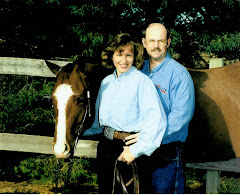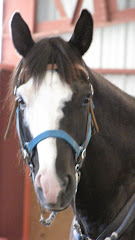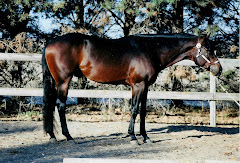Today, I'm picking up horse feed for the winter. One hot topic with horse owners is the discussion about horse feed/grain/nutrition! So I thought I would raise this question on my chat group, Horses Are Our Lives chat. Come by to check it out! (click on the title to visit or join)
I ask readers to answer these questions: What works for you and what doesn't work for you. I think we can all learn from each other, rather than debate it. Let's keep it simple: state what you feed, pros, cons. that's it. Then when you have a question about someone else choice/s, ask a nice question.
I also want people to know that what may work for someone may not work for someone else. You need to take into consideration the age and work load of the horse, money that the owner has available to spend on hay and grain, health of the horse, and overall attitude of the horse - they may just be a hard keeper!
What works for me, with a variety of ages of my horses, from 2 year olds to teenagers, workload, and broodmares. I feed a pelleted feed that has high levels of vitamins and minerals, like Nutrena Compete or Safe Choice or Purina Strategy. When I need to put extra weight on the horse, I add Nutrena Empower or Purina Amplify. My horses are all on round bales. This year, we are throwing the hard keepers a couple of flakes of alfalfa.
Pros: High levels of nutrients, with the trace nutrients that aren't in a oat/corn mix. This feed is highly digestible and the horse utilizes everything that it eats. This works for my young growing horses, working horses, and brood mares - all with higher nutrient requirements. The horses look better, with a shine, and they put on weight faster and keep it on.
Cons: maybe a little more expensive, BUT you feed less of these grains, so when you compare # and $, you are almost even. I can’t find a con of feeding a feed high in nutrients, and formulated for the working horse.
I had Dionne ask about her horses. Here is what she said about them, and I’ll put some thoughts down as I’m reading her info again.
“I have two Percheron mares, and an Appaloosa we just acquired for Daphne for 4-H. As I’m re-reading Dionne’s info about her horses, first, I am not knowledgeable on the draft breeds and their special requirements.
Out of my mares -
Dakota is a hefty 1950 lbs, easy keeper, very piggy on the food.
Abby is a dainty 1800, not as easy to keep and would rather be loved on than eat.
Pete automatically gets pushed around, probably because he's a boy, and he's new and much smaller than they are. I think, just guessing, that he's around 14.3h and maybe 900 lbs. He has a very low body condition score (I'd say between 3 and 4) and needs to gain some serious weight. He has the foundations for nice muscle, but topline is very thin, all the way to the tail, and I can see/feel ribs.
Me: I asked her about the worming and teeth floating history. Her reply:
“They are all wormed regularly - everyone got Ivermectin after our first hard frost, the first week in Nov. Teeth, well, not sure any of them have every had anything done. I have not felt any sharp edges, hooks or gaps in the girls' mouths, no dropping feed, balling feed or head shaking while bridled-type behaviors that would make me think they might have a problem. They are always fed on the ground (or at least lower than level, for them) so they should be grinding evenly. Pete - I'm not sure, I'll have to ask about his teeth - but same goes for him, nothing that obviously suggests tooth issues.”
Me: Even though you can't feel sharp edges, we can't reach back far enough without a mouth speculum in, to feel the edges of the back molars. I'm thinking you may have some sharp edges way back, and it usually doesn't cost anything for a vet to check, unless he is making a trip and you have to pay a trip charge. He might charge a fee to check, and I would ask what his fees are before he comes out.
Out of all that - I've done a bunch of research for feeding drafts grain. What is recommended for putting weight on them is just oats and 2 cups oil per day.
Me: With my experience with Quarter Horses, oats alone does not meet their nutrient level, even fed with Alfalfa hay. 2 cups of oil is a lot, and I would watch that they don’t get the runs. If it is too oily, they may not eat their feed.
Sounds simple. So - each evening I've been giving Abby two of those big, red scoops (one full scoop will fill one of those big coffee cans - like Folgers or Maxwell house - the 2.5 lb plastic ones with the grips) of oats with (and I worked up to this over a couple weeks) 2 cups of veg oil. The "old-timers" say they feed their drafts a half a (5-gallon) pail of oats per horse per day.
Me: Weigh your feed. Know what you’re feeding. Oats is lighter than grain, so the coffee cans
would probably be 3# of a grain mix, but may only be 1# of oats. I will go from 0 # of grain to 2# in a week. I usually feed ½ # for 2 days, then add ½ # every 2 days until I get to the amount that I want to feed.
Dakota gets maybe 3/4 scoop of plain oats so she doesn't feel left out and will stand quietly while the others eat.
Me: if a horse doesn’t need something, don’t feed it. Dakota is heavy and an easy keeper. Let her paw or walk the fence line because she’s not getting fed. She’ll lose some weight this way. Don’t feed a heavy horse extra grain.
The oil has definitely taken some of the dryness out of her coat, and may be adding a little bit of weight, but not like I thought it would. Drafts are prone to EPSM, so I'm not taking any chances and feeding high carb/sugar/starch stuff like sweet feed. Leading draft vets say that oil is the best way to add weight.... I'm just not seeing it.
Me: Now there are very good pelleted feed that are low in carbs. That is what I would recommend that you research to see if you can feed it to your drafts.
Pete, well he's a challenge. I talked to the guys at the Coop, looked at the difference between the Omelene and Strategy and Senior - and picked up some Strategy for him, since it's highest in fats. He has some weird feet, so I didn't want to founder him and have been nervous feeding grain. Worked him up to one whole scoop of Strategy in the evening.
Me: Once again, I need to know POUNDS. To gain weight, he could be fed 4-5# twice a day, and feed a high fat supplement. The fat helps them to utilize their feed. One scoop is probably only 2 - 2 1/2 #, which is maintenance level. You need to feed a lot more to have him gain weight.
Did that for 2 weeks and didn't see much improvement - so I added in a morning feeding for him, and worked him up to a whole scoop in the morning, too, and increased his evening ration to 1 1/2 - 2 scoops. We've been feeding this way for a month now. How much is too much? I think I'm feeding him at max recommended serving size for the performance horse - which he is not, right now, but needs to gain.
Me: I think he is getting 2# in the morning, and 4# in the evening now. I think he needs 4# in the morning, with ½-1 # of a fat supplement, building that up slowly too. Or maybe just the oil on his grain would be fine. Pete is not a draft and may not utilize the oil the way that the draft horses do. I would feed a high fat supplement instead, as it would be a more highly digestible form.
I've read some comments/posts about Amplify, chelated minerals, bran, beet pulp..... so many varying opinions.
Me: lots of choices, and you are doing the right thing - reading about everything, asking questions, and trying to make the decision that works for you and your horses. Chelated minerals, or Nutrena’s minerals are formulated differently, as they are one-on-one with an amino acid, are more highly digestible, and are absorbed in the intestinal tract where they need to be to benefit the horse. Bran and Beet Pulp would add fiber, not necessarily the nutrients that he needs to gain weight.
So - I switched Abby (mixed with oats for now to use up the oats) to Strategy, too, giving her equivalent of 1 1/2 scoop Strategy once a day and kept the oil in. Dakota gets 1/2 scoop.
Me: Take away Dakota’s feed, as she is fat. Abby is getting 3# plus the oil, with oats right now, so unless she needs to gain weight, that should be fine. Remember, you have drafts, so she may need more than that. I feed my QH’s 2-3 #/day. Your draft may need 4-6# for maintenance.
Hay - well, I peel round bales of grass hay and hand feed them twice a day (gives me exercise and helps cut down on their wastefulness). Since Dakota is so bossy, I make 3 piles to be sure that Pete will always have his own place to eat. I fill a 2x2x6 ft tank heaped high (where the girls usually stand and eat), then the other two piles of half that, each - so I put out approximately 100 - 140 lbs, twice a day, more if it's really cold or the quality is not as good.
Me: I think it’s hard to determine how much hay they get when it’s fork off the round. I am doing that to one of my horses right now, and so I just feed enough that there is some hay in his
feeder all the time. I don’t like the horses to run out of hay.
Water - they have a 100 gallon tank that I keep clean and full. The three of them will completely drain it in 2 1/2 days. Haven't had to use a heater yet!
Me: remember, as the weather gets colder, they will probably drink less, so the salt you’re feeding is important to keep them drinking more water.
Salt/minerals - they have free-choice salt blocks - one salt, one sulfur (I use that in the summer - helps with the flys) and one brown mineral one.
Me: I’m not sure about the sulfur block. I don’t know if that is too much sulfur for horses. Remember, mineral blocks are mostly salt, so they really aren’t getting the minerals they need from a mineral salt block. With feeding Strategy or Purina Senior, they shouldn’t need the extra minerals, just a white salt block.
So - given all my info and what I do.... I'm seriously open to suggestions, as I'm totally baffled. I've never had to put weight on horses, and have never really fed grain. I've always been good with just good grass hay, giving a little oats when it gets below zero and I'm working them hard. But, for some reason this year - I have two very different horses that I would like to see with a bit more weight before it gets cold.
Pros - I can get some exercise every day feeding hay the way I do. I get to give the horses a good "once-over" twice a day. We get some bonding time and they learn manners and routine. Oats/oil = Strategy in cost.
Cons - I'm not sure what to do with the grain!!! I guess I was expecting a magic bullet with the Strategy and haven't seen it. Thanks a bunch!
Me: Right now this is what I'm thinking - that when you feed for gain, you need to feed more than you normally would. So if 4# would be enough feed to maintain, I would increase slowly until I'm feeding 8# until I get the weight I want. I would feed a high Fat supplement, as fat helps in utilizing the nutrients. I would also feed a flake or 2 of alfalfa, for the extra forage quality. I would get their teeth checked, and possibly have Abby and Pete floated. I would separate to grain, and give Abby more if she needs to gain weight, and increase Pete’s feed slowly. Keep putting the oil on the feed, maybe not as much on Pete’s feed.
I don’t think you have seen the change that you thought you would because you still need to feed more for the weight gain. I think you are feeding for maintenance, but once again, weigh your scoops of feed and then we’ll know how much you are feeding!
We had a little 14 hand reiner, who got 4# twice a day plus 1# of a high fat supplement to keep weight on during show time. That’s a lot of feed, but she needed it. And I kept hay in front of them all the time!
Try increasing your feed some more, and see if you can see the difference in another week. Maybe you should weight tape Pete so you can see if he is gaining weight!
Good discussion, Dionne! Let me know your thoughts on this!
Turning Night to Day
9 years ago







2 comments:
I like what you said about weighing the grain and also about how you can't tell if they need their teeth floated just by feeling because we can't get all the way back there without one of those gadgets.
Thanks, GP. I don't weigh all my grain all the time, as I know how much my "coffee can" measure weighs, depending on the grain I'm feeding. I think we all should weigh whatever measure we use, even if it is a scoop. I don't like scoops because you could get 3/4, full or overflowing scoop, and therefore be changing the amounts slightly. Then there are so many sizes and types of scoops - so how would you know what you are feeding if you don't measure?
Post a Comment